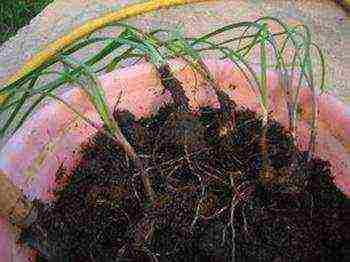Content
- 1 Landing dates
- 2 Seed preparation
- 3 Garden bed preparation
- 4 Seat selection
- 5 Landing
- 6 Carrot care
- 7 Harvesting
- 8 Planting carrots in the Urals: planting dates
- 9 Planting carrots: preparing seeds
- 10 Planting carrots: preparing the garden
- 11 Planting carrots: choosing a place
- 12 Planting carrots
- 13 Carrot care
- 14 Harvesting
Carrots are a very useful root vegetable, very unpretentious and popular. It is grown in all regions of the country. Including in the Urals. All summer residents probably know about the rules for caring for this plant. However, novice gardeners often make mistakes when growing carrots, which seriously affects the yield. Therefore, further in the article, we will consider step by step how carrots are planted in the Urals, as well as how to properly care for this root crop.
Landing dates
First, let's figure out when exactly this culture should be planted. The timing of planting carrots in the Urals is not much different from the time of sowing in other areas of the middle lane. Their choice in relation to a given culture is a very important question. The yield of carrots directly depends on how correctly the magpies of sowing are chosen. It is impossible to tighten the landing in any case. When the soil warms up to 10 degrees, various kinds of parasites begin to develop in it, which can damage the tender young roots. But you can't plant carrots too early either. Otherwise, it will go to the arrows. Roots will not develop in this case.
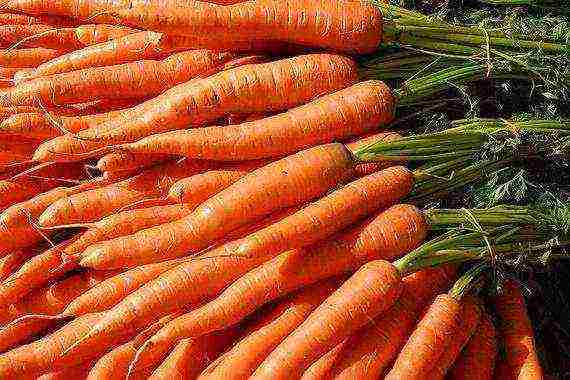
The optimal sowing dates are considered to be mid - end of April, when the air outside warms up to + 10-15 degrees during the day and up to + 5-7 at night.
Sometimes carrots are planted in the Urals in the fall. However, since the winters in the Urals are quite cold, local summer residents do this very rarely. If someone wants to choose just such a planting method, sowing is best done after the soil temperature reaches at least +7 degrees. Otherwise, the carrots will sprout, which will simply freeze in the cold.
Seed preparation
Thus, the time of planting carrots in the Urals is April. But whenever it is sown (even if the seeds are germinated), it will grow rather slowly. In order not to wait too long for the sprouts to appear, the seeds should germinate before planting. To do this, they are wrapped in a damp cloth (moistened with a not too concentrated ash solution) and placed in the refrigerator for a couple of days.

You can start planting after the first roots appear. The seeds need to be dried a little (within half an hour).
Garden bed preparation
Planting carrots in the Urals, as in other regions of the country, must be done correctly. This culture has one more feature. Unlike most other root crops, it does not tolerate manure at all. If you fertilize the beds with them, the roots will grow "shaggy" and ugly, lose their taste, and will also be worse stored.
However, you still need to fertilize the soil before planting. For this, mineral fertilizers should be used. Very good for increasing the nutritional value of the soil, for example, such a mixture is suitable:
- urea - 10-15 grams,
- potassium chloride - 15-20 grams,
- superphosphate - 30-40 grams.
This amount of fertilizer is enough for about 1 m2 of the garden.
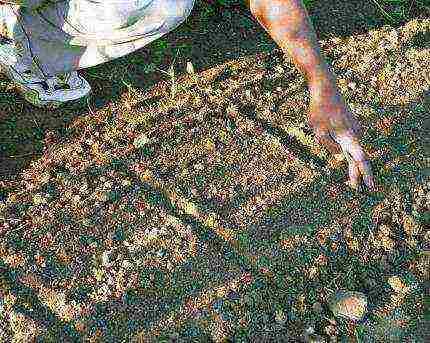
Seat selection
As in any other area of the middle lane, carrots in the Urals are usually planted in a place well-lit by the sun. Since in the first seedlings rise very slowly, it is advisable to choose an area that is least infested with weeds. Grass sprouts can simply clog. It is very difficult to weed small carrots.
The best precursors for carrots are cucumbers, cabbage, potatoes and tomatoes. She absolutely does not tolerate the neighborhood of dill. When choosing a place for a garden bed, all this must be taken into account. In this case, the carrots will not hurt and will give a good harvest.
Landing
So, with such issues as the timing of planting carrots in the Urals, the choice of location and preparation, we figured it out. Now let's see what the actual sowing rules for this crop are. The seeding depth of carrot seeds depends on the type of soil on the site. If it is heavy and clayey, the planting material should not be buried more than 1-1.5 cm.On light soils, seeds are covered by 2 cm.
The planting material for carrots is very small. Therefore, sowing should be done carefully, trying to distribute it along the pre-made groove as evenly as possible. In the future, the carrots will have to be thinned a couple of times. This operation is also quite responsible. Removing extra plants, you can damage the rest. To avoid this, many summer residents resort to all sorts of tricks.
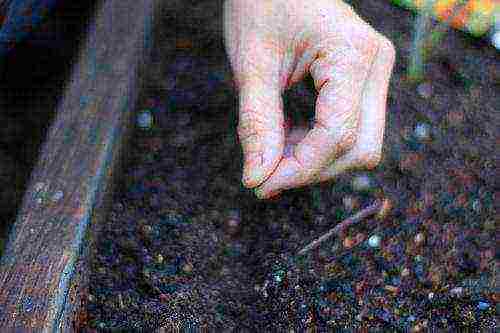
For example, to spread the seeds less frequently in the groove, you can mix them with a small amount of sand. And it is better to purchase a special planting material in granules. In this case, carrots can be planted in the same way as other root vegetables. That is, make grooves in the ground and put a granule in each. It is definitely not necessary to thin out the plants with this sowing method in the future. Planting carrots in the Urals in granules is actually a very convenient way.
Sow carrots in rows, the distance between which should be about 20 cm. Between the plants themselves, 3-4 cm are left for varieties with a long root crop and 5-10 cm for cone-shaped carrots.
After the seeds are planted, they need to be sprinkled with earth, and the bed itself must be carefully watered. Then an inverted rake is passed over the surface of the soil. This is necessary in order to increase the contact of seeds with soil moisture. This is how carrots are planted in the spring in the Urals. If you follow all the rules, you can get an excellent harvest of this crop. But, of course, only if it is done correctly.
Carrot care
The climate in the Urals is practically no different from the weather conditions in other regions of central Russia. Summers are usually dry here. Adequate moisture is what carrots love. The cultivation of this root crop in the Urals will be successful only under the condition of timely periodic watering. At first, the soil under the plants is moistened twice a week, pouring not too much water onto the garden bed.

As soon as the roots grow, the frequency of watering can be reduced. The soil under adult carrots is moistened about 1 time per week, while increasing the amount of water.
Plants are fed twice a season. Instead of manure or compost, use a solution of nitroammofoska (1 tbsp / l. Per 10 l of water). The first feeding is carried out one month after germination, the second three weeks after that.
Harvesting
The timing of harvesting root crops depends on the variety. For the Urals, such varieties as "alenka", "tushon" and "vitamin", for example, are quite suitable. The first variety ripens very early. Ural summer residents begin to pull out the roots of this variety within one and a half to two months after planting. This carrot is actually very tasty and sweet.
"Tushon" ripens a little later (one and a half weeks). These carrots are great for making pilaf. Even the young roots give the dish a pleasant taste.
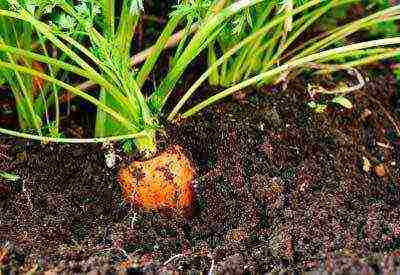
"Vitamin" carrots are a late variety. Its roots ripen three months after planting. In terms of vitamin content, as the name suggests, this is the best carrot.
As you can see, carrots (growing in the Urals is a simple procedure) is an unpretentious root crop, but it requires some attention.If you do everything right - do not rush and do not delay planting, do not thicken the beds and do not use manure, you can just get an excellent harvest of this crop.
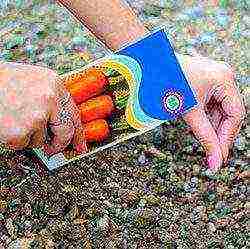 Ivan
Ivan
When is the best time to plant carrots in the Urals?
In the zone of risky farming, it is difficult to determine the timing of planting any crop. When is the best time to plant carrots in the Urals - the question requires clarification. The timing of planting in open ground depends on the following factors: in which specific region of the Urals, which carrot varieties, for what purpose it is planned to plant.
In the Urals and not only: the timing of planting carrots
- Winter sowing - from the last decade of October to the first days of November.
- Early planting - when the soil warms up to + 5 ... + 7 ° C, after the snow melts, from the second decade of April.
- Average terms - early May, its first half.
- Late dates are mid-May, the last decade and up to the beginning of June.
The climate of the northern Urals differs significantly from the Trans-Urals and the southern part. Accordingly, the terms also differ:
- in the Northern Urals, sowing is advisable to carry out in mid-May, at the end;
- in the South Urals, carrots in the open field can be sown as early as April;
- in the Middle Urals, they are sown both in early May, provided the snow leaves early, and in the middle of the month.
Attention! Early varieties of carrots, with rare exceptions, are not subject to long-term storage.
Purpose justifies the time
- Earliest harvest. It is planned for the first marketable product, more often for bundled products, for personal consumption. You can get the earliest carrots as a result of winter sowing, October or November. The planned harvest will be 10-14 days ahead of the spring sowing of the same variety. In the season with an early, dry spring - the advantages are obvious: the seeds swell well in melt water, the seedlings are friendly. You should be ready for early harvests - by the second decade of August. Delay in harvesting threatens cracking of root crops, a decrease in keeping quality. In regions with frequent thaws in late autumn, the idea of winter sowing should be abandoned: losses are inevitable.
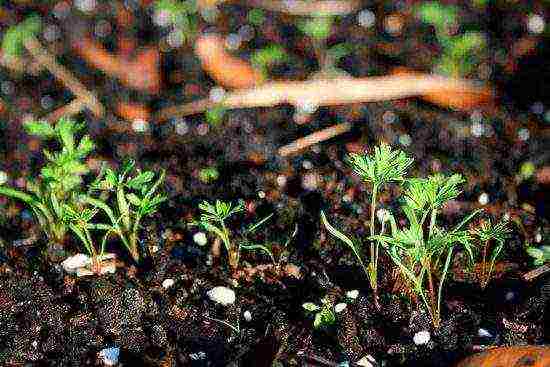
- For early production. It is advisable to choose early planting dates - with snow melting, in April, at temperatures up to + 10 ... + 12 ° C in the daytime, soil - up to + 5 ° C. Landings are arranged under arcs, in tunnel-type shelters. If May, June are dry, planting is carried out either in winter, or postponed to a later date.
- For long-term storage. Farmers and summer residents choose medium terms - mid-May or early. The moisture content of the soil is sufficient, as is the temperature - in the presence of rains, the seeds will germinate together. Theoretically, carrots can be sown for storage in early June. In practice, dry summers inhibit root crop growth even with sufficient irrigation.
Advice. Mid-May is not considered a favorable time for planting carrots due to the appearance of carrot flies, beetles, etc. Planting is transferred or preventive treatments are planned, varieties that are especially resistant to pests are chosen.
The variety suggests the timing
The most important selection criterion is the growing season, that is, the period from germination to harvesting.
- Early varieties of orange root crops have a growing cycle of about 85-100 days, bunches - even after 50-55 days. Used to obtain super-early marketable products. They are not subject to long-term storage, they are characterized by low keeping quality - up to 4 months. Among the early ripening varieties with excellent consumer and market qualities are Alenka, Karotel Paris, Dragon, Mars F1, Laguna F1, Bangor F1, Zabava F1, etc.

- Medium-term varieties have a growing season of 105-125 days with a keeping quality of 6-7 months. They are chosen for summer personal consumption and storage, for sale. Suitable: Samson, Shantane, Altair and Viking, Calisto and Vitamin 6, Leander and Canada F1, Losinovstrovskaya 13, Nandrin F1, Expredo F1 and others.
- Late varieties are chosen for long-term winter storage. Their vegetation cycle is more than 125 days - up to 140 days.For winter sowing, frost-resistant varieties are chosen, as a rule, for spring consumption, with a relatively short growing cycle. Among those tested by farmers and summer residents are Valeria 5, Berlikum, Perfection, Nuance, Totem F1, Scarla, Nantes 4, Touchon, Moscow Winter, Vita Longa, Selecta, Shantane 2461, etc.
Having chosen well not only the time for a particular region, but also the variety, you can be sure that carrots, a cold-resistant culture, will give friendly shoots, a good harvest.
How to plant carrots: video
.
Carrots are planted in all regions of Russia. The difference lies in the climatic conditions of each region, which must be taken into account when growing it. There are many problems, on the correct solution of which the yield of this vitamin vegetable depends. The more difficult the weather conditions, the more difficult it is to deal with diseases and pests. These are the problems encountered when planting carrots in the Urals. Thanks to agrotechnical methods, they learned to get high yields here.
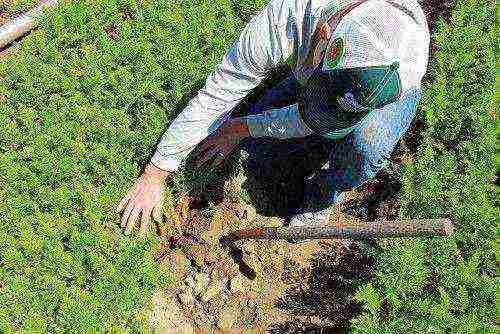
A good harvest of carrots can be obtained even in difficult climatic zones of the Urals
Variety selection
Carrots, unlike many crops such as tomatoes, are not afraid of small drops in temperature. Therefore, choosing the best seed varieties is not a problem. There are many zoned varieties that give good yields in the Ural regions. These include such types as "Napoli F1", "Samson" and "Vita Longo". Carrots are rich in beta-carotene and contain many trace elements. The variety chosen must guarantee a good harvest, therefore its choice is of great importance.
When purchasing a variety you like, it is important to take into account information about the sowing time, ripening time and storage duration. Planting carrots in the Urals requires knowledge of a number of features, which consist in the following recommendations:
- The root crop will give a good harvest and will be stored for a long time when the best Russian varieties are preferred. They were bred specifically for such regions with a difficult climate.
- When purchasing imported varieties of seeds, you should be aware that the products obtained from them are poorly stored and are suitable only for quick sale. You can make salads from it, make juices or use it for sale. They look very attractive, even and smooth, but they are not suitable for long-term storage.
- Sowing carrots can be done at different times. Usually late sowing is used for winter storage.
- There are varieties of carrot seeds with different characteristics: purple rind color, round fruit shape, carrot flavor reminiscent of nuts, root vegetable without a core, vegetables resistant to cracking and various diseases.
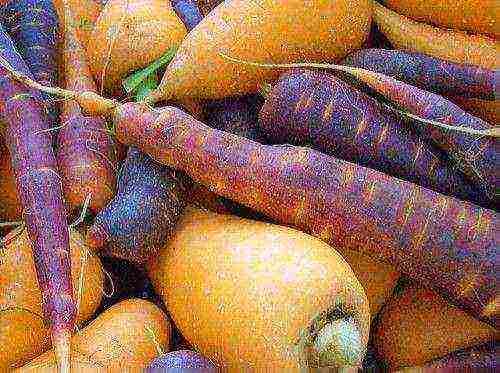
Recently, many different colored varieties of carrots have appeared.
Boarding time
The Ural belongs to regions with different climatic conditions in its territorial parts. They can differ significantly in the northern and southern regions. Carrots are crops that can be sown early, immediately after the snow cover has melted. But a prerequisite for sowing is soil warming up. The minimum temperature can be 5⁰C heat. If you sow carrot seeds in cold soil, then seedlings will appear much later, and growth will be slowed down. Typical for different regions is:
- For the South Urals, the temperature already in April reaches the required standards and you can land.
- In the regions of the Middle Urals, early May is suitable for sowing, provided that there is no snow. A later planting is not excluded, until the end of May. With sufficient moisture and proper soil preparation, root crops grow well and are stored better.
- The northern regions of the Urals are characterized by a colder climate. Therefore, all garden work is carried out from the end of May.
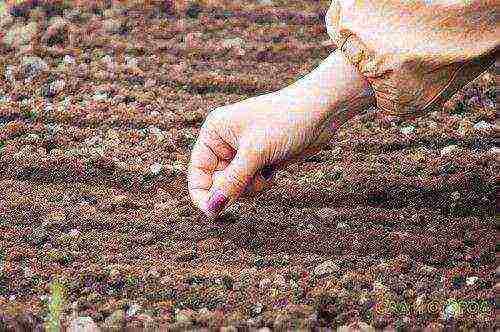
In the North of the Urals, carrots are planted at the end of May
Preparing the beds
The yield of carrots will be much higher if the beds are prepared for planting in the fall.The work carried out includes the following recommendations:
- It is necessary to dig up the ground deeply, preferably on the bayonet of a shovel. This is to ensure that this healthy vegetable grows long and beautiful. If you dig up the soil at a shorter distance, then the tips of the carrots will be crooked and bent.
- It is forbidden to add fresh organic matter to the garden bed prepared for planting carrots. As a result, the root vegetables will have an ugly shape.
- It is recommended to add urea in the amount of 10-15 g per 1 m², superphosphate - 40 g, potassium chloride - 30 g and ash - 50 g.
- Carrots are protected from pests, the most dangerous of which is the carrot fly. To scare it away, it is recommended to plant an onion on a feather next to the carrot. It is useful to plant feverfew along the edges of the garden. These are the best "neighbors" of carrots.
- It is necessary to add sand to all areas except sandy ones. If the soil is thin, it is recommended to add mature compost to it.
Preparing the soil for planting carrots is easy enough. For those who live in the middle and northern regions of the Urals, it is recommended to make ridges 1 m wide and about 40 cm high. This applies to areas where there is a close occurrence of groundwater. For the southern regions, the beds are made common, since it is much warmer there. Tall beds provide better plant growth and prevent root decay.
For the winter period, the beds are covered with mulch, which keeps the soil loose and soft until spring. This is the soil that carrots prefer.
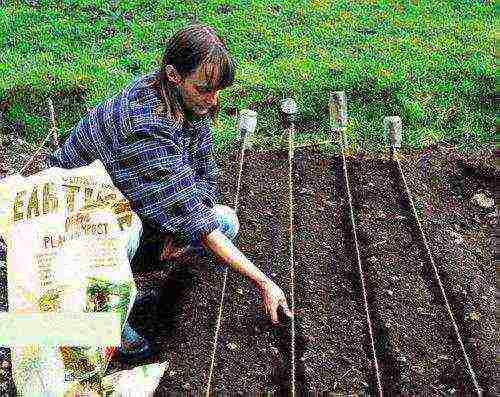
The land for carrots must be dug deeply, otherwise the fruits will have difficulties in growth
Normal landing method
This method is the simplest and most inexpensive. Sowing from a regular bag of seeds is very cheap. Is as follows:
- Seeds of the selected variety in cotton cloth are placed in Epin's solution for 2 minutes. The solution is prepared in the following way: add 3 drops of this substance to half a glass of water.
- Then squeeze out excess moisture and leave for 4 hours to soak. After that, the seeds are washed with clean water and laid out on glass to dry.
- Planting is carried out in the usual way: grooves are made across the beds in 10 cm increments, and the sowing depth is about 3 cm. It is necessary to compact the soil after sowing. Under favorable conditions, seedlings will appear in 10 days.
- This method has the disadvantage that thinning must be performed after germination.
- To fight the carrot fly, cover the bed with material on top. Dangerous is the time when cherries begin to bloom. It is during this period that carrot flies appear.
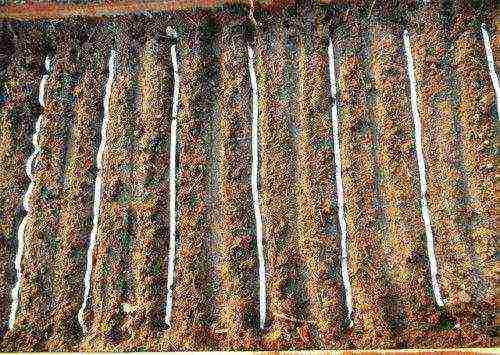
You can put paper ribbons on the bottom of the garden to see the carrot seeds.
Planting method with granular seeds
Carrot seeds in granules are large enough. This makes it easier to fit. The disadvantage is that some of these seeds are not germinating. We have to re-sow, wasting time. Seeds in granules cannot be treated with any preparations. The period for the first shoots to appear is longer than usual. The soil for such seeds must be constantly moist.
Under favorable conditions, carrots from such seeds grow very large, which negatively affects its taste.
Joint landing
This method involves growing carrots with onions or next to garlic. The benefit is twofold. If you plant onions with carrots, it will get rid of the carrot fly. The disadvantage of this method is that before harvesting, onions and garlic do not require watering, when the carrots really need moisture during this period. More modern gardeners do this. The bed is divided lengthwise into 2 parts. Where the plot is higher, it is recommended to plant onions or garlic, and carrots are sown on the other half.
Other planting methods are known. The seeds are glued onto strips of toilet paper, mixed with sand or sleeping tea. There are many options, choosing the best and more affordable one.
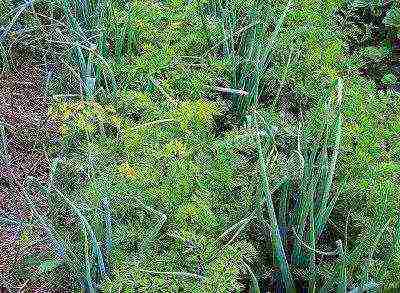
Onions and garlic get along well in the same garden with carrots.
Method of accelerating germination
Dry seeds germinate very slowly, especially in the difficult climatic conditions of the Urals. When conditions are favorable, seedlings appear in two weeks. In cold and dry weather, seeds germinate only on the 26th or even 30th day. Excess moisture is destructive for them. In order to accelerate germination it is necessary:
- For 20 minutes, soak the seeds in water with a temperature of 48⁰C to 50⁰C.
- They are placed in a solution of trace elements for 24 hours.
- After that, they are thinly scattered and covered with a damp napkin or cloth for a couple of days until the first shoots appear. The temperature should be at least 15⁰ С.
- Sprouted seeds are sown in prepared soil.
Sometimes lighthouse seeds are added to carrot seeds. It can be salad mustard. It sprouts much earlier than carrots, thus marking the rows for weeding.
Since the climate in the Urals is cold, an opaque film or mulch with peat will help speed up the seedling. When the first shoots appear, the film is removed to avoid stretching the plants. Seedlings are able to withstand subzero temperatures, down to -3 and -4⁰ С.
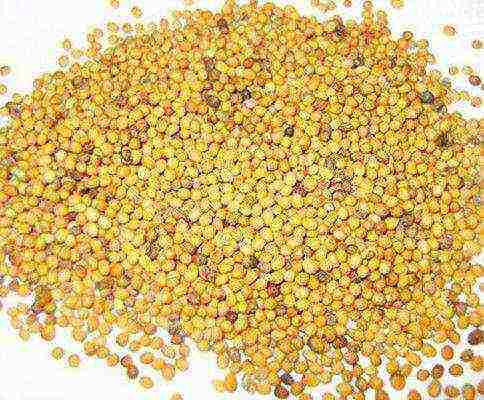
Mustard seeds can be mixed with carrot
Diseases and their prevention
Carrots are susceptible to a number of diseases. This is especially true for the cooler regions of the Urals. Among the diseases, the most famous are:
- White rot, manifested by the appearance of white bloom on the carrots. This can be due to the fact that the soil was contaminated even before sowing the seeds. When nitrogen fertilizers are applied in excess, white rot may form. If vegetables are sprayed with preparations containing copper, then the disease can be avoided. Frequent ventilation, disinfection and selection of seed varieties can help prevent this disease.
- Bacteriosis manifests itself in the fact that yellow spots appear on the lower leaves. Later, they turn brown, curl, and in the worst case, dry out completely. The spread of the disease occurs by seeds and plant debris. Therefore, seeds are harvested only from healthy plants and kept in hot water (52 ° C) for 15 minutes.
- Felt carrot disease (red rot), which is characterized by the appearance of purple and brown spots on the roots. Subsequently, in places of spots, black sclerotia of fungi appear. Too high a temperature with high humidity promotes the formation of rot. Most often it develops in repositories. For prevention, it is recommended to remove diseased root crops.
- Gray rot that affects carrots during storage. The disease begins with the appearance of a gray felt coating on the tip. This can be prevented by choosing the right variety and observing the necessary storage rules.
It is quite difficult to grow high-quality carrots in the difficult climatic conditions of the Urals. But with the help of modern technologies, it is possible to get a good harvest of this vitamin product.
Subscribe Be aware of new products on our site
Planting carrots in the Urals: terms. Carrots: growing in the Urals
Rate this post
Carrots are considered one of the healthiest root vegetables around. In addition, this vegetable is very unpretentious. It can be grown in all regions of our country, even in the Urals. Probably, today all summer residents already know the rules for caring for this plant. However, quite often, novice gardeners make serious mistakes when growing carrots, which can affect productivity. Further in this article, we will look at how to properly plant carrots in the Urals, and also talk about the basic rules for caring for carrots.
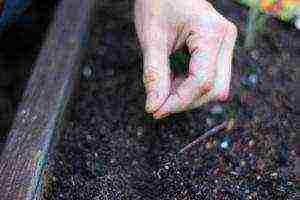 Planting carrots in the Urals: planting dates
Planting carrots in the Urals: planting dates
Let's first figure out when to plant carrots. The timing of planting carrots in the Urals is not much different from the timing of sowing carrots in other regions. The correct choice of sowing dates will directly depend on the yield of carrots.In no case should you tighten the landing. When the soil warms up to 10, parasites of various kinds can begin to develop in it, which can have a negative effect on young roots. But planting carrots too early is also not worth it.
She can go to the arrows. In this case, the roots may not develop. The optimal time is the end of April. The air should warm up to + 10-15 degrees during the day and + 5-7 at night. Planting carrots in the Urals can sometimes be carried out in the fall. Still, the winters in the Urals are quite cold, so summer residents rarely do this. If you want to choose this particular planting method, then it is still better to carry out sowing only after the soil temperature reaches at least +7 degrees. Otherwise, carrots can sprout, which will simply freeze.
Planting carrots: preparing seeds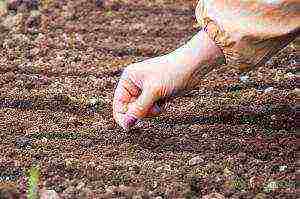
Carrots in the Urals are best planted in April. But whenever you sow carrots, they will grow rather slowly. It is recommended to germinate the seeds before planting so as not to wait too long for the sprouts to appear. Seeds just need to be wrapped in a damp cloth soaked in a concentrated ash solution, and then placed in the refrigerator for a couple of days. After the first roots appear, you can start planting. In this case, the seeds can be pre-dried a little.
Planting carrots: preparing the garden
In the Urals, as in other regions of the country, it is important to correctly plant carrots. This culture has one important feature. It does not tolerate manure, unlike other root crops. If you fertilize the beds with manure, the roots will turn out to be ugly and "shaggy", lose their taste and will be worse stored. But before planting, you still need to fertilize the soil. For this purpose, it is recommended to use mineral fertilizers. To increase the nutritional value of the soil, such a mixture is well suited: 10-15 grams of urea, 15-20 grams of potassium chloride, 30-40 grams of superphosphate. This amount of fertilizer is quite enough for 1 square meter of the garden.
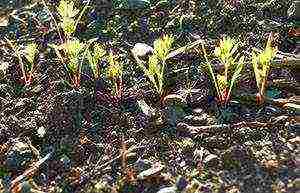 Planting carrots: choosing a place
Planting carrots: choosing a place
Planting carrots in the Urals, as in any other area of the middle lane, should be carried out in a place well-lit by the sun. Since the first shoots rise very slowly, it is advisable to choose an area that is not infested with weeds. The grass can just clog the sprouts. Experienced summer residents should know how difficult it is to weed carrots. For carrots, cabbage, cucumbers, tomatoes and potatoes are considered the best predecessors. It should also be borne in mind that carrots do not tolerate the neighborhood of dill. This must be taken into account when choosing a place for the garden. In this case, carrots will give a good harvest and will not get sick.
Planting carrots
We have dealt with such important points as seed preparation and site selection. Now let's look at the basic rules for sowing carrots. The planting depth of carrot seeds will depend on the type of soil on the site. If the soil is clayey and heavy, then the planting material should not be buried more than 1-1.5 cm. Seeds on light soils are planted by 2 cm. Carrots have very small planting material. Therefore, sowing should be done very carefully, trying to distribute it as evenly as possible over the groove already made. Carrots will need to be thinned out a couple of times in the future. This is a rather responsible operation, because by removing excess plants, you risk damaging the rest. To avoid this, many summer residents resort to various techniques.
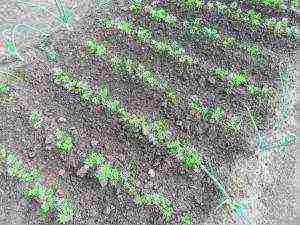 For example, so that the seeds are less likely to be distributed in the groove, they are mixed with a small amount of sand. You can also buy special planting material in granules. In this case, carrots can be planted in the same way as other root crops: make small depressions in the ground and put a granule in each. With this sowing technique, you definitely won't have to thin out the plants. In fact, planting carrots in pellets is a very convenient way.Carrots are sown in beds, the distance between which should be about 20 cm. Between the plants, leave 5-10 cm for cone-shaped carrots and 3-4 cm for varieties with a long root crop. When the seeds are planted, you need to sprinkle them with earth, and then gently water the garden bed. After that, you need to walk on the surface of the soil with an inverted rake. This is done to increase seed contact with moisture from the soil. This is how carrots are planted in the Urals in the spring. If you follow all of the above recommendations, you can get an excellent harvest of carrots.
For example, so that the seeds are less likely to be distributed in the groove, they are mixed with a small amount of sand. You can also buy special planting material in granules. In this case, carrots can be planted in the same way as other root crops: make small depressions in the ground and put a granule in each. With this sowing technique, you definitely won't have to thin out the plants. In fact, planting carrots in pellets is a very convenient way.Carrots are sown in beds, the distance between which should be about 20 cm. Between the plants, leave 5-10 cm for cone-shaped carrots and 3-4 cm for varieties with a long root crop. When the seeds are planted, you need to sprinkle them with earth, and then gently water the garden bed. After that, you need to walk on the surface of the soil with an inverted rake. This is done to increase seed contact with moisture from the soil. This is how carrots are planted in the Urals in the spring. If you follow all of the above recommendations, you can get an excellent harvest of carrots.
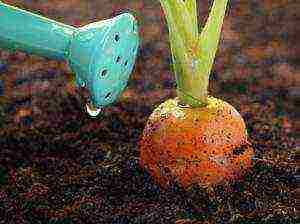 Carrot care
Carrot care
In the Urals, the climate is practically no different from the weather conditions in other regions of central Russia. Usually dry summers here. Carrots love enough moisture. Therefore, the successful cultivation of this root crop in the Urals will be possible only under the condition of periodic watering. At first, the soil with plants should be moistened twice a week. The garden should be watered with not too much water. When the roots of the plants grow a little, you can reduce the frequency of watering. It is enough to moisten the beds with adult carrots once a week, while the amount of water can be increased. Plants need to be fed twice a season. Instead of compost or manure, a nitroammophoska solution is used. The first time feeding is carried out about a month after the emergence of shoots. The second feeding is carried out three weeks after that.
Harvesting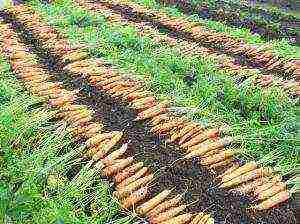
The harvest time depends mainly on the variety. For the Urals, varieties such as "vitamin", "tushon", "alenka" are best suited. The latter variety ripens quite early. Ural summer residents begin to pull out the roots of this variety 1.5-2 months after planting. In fact, the carrots of this variety are quite sweet and tasty. The "Tushon" variety ripens one to one and a half weeks later. This variety is perfect for making pilaf. Even the young roots of such carrots will add a pleasant aroma to the dish. Variety "vitamin" of all the listed is the latest. Its roots ripen after 3 months. As the name suggests, this variety is the best in terms of vitamin content. As you can see for yourself, carrots are quite an unpretentious root vegetable, but they still require some attention. If everything is done correctly, do not delay and do not rush with the planting dates, do not plant the beds too densely and use the correct feeding, then you can get a good harvest.


